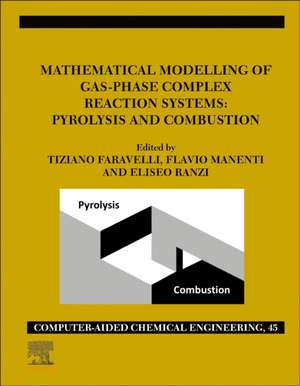Mathematical Modelling of Gas-Phase Complex Reaction Systems: Pyrolysis and Combustion: Computer Aided Chemical Engineering, cartea 45
Tiziano Faravelli, Flavio Manenti, Eliseo Ranzien Limba Engleză Hardback – 7 iun 2019
- Details thermochemical properties and "ab initio" calculations of elementary reaction rates
- Details kinetic mechanisms of pyrolysis and combustion processes
- Explains experimental data for improving reaction models and for kinetic mechanisms assessment
- Describes surrogate fuels and molecular reconstruction of hydrocarbon liquid mixtures
- Describes pollutant formation in combustion systems
- Solves and validates the kinetic mechanisms using numerical and statistical methods
- Outlines optimal design of industrial burners and optimization and dynamic control of pyrolysis furnaces
- Outlines large eddy simulation of turbulent reacting flows
Din seria Computer Aided Chemical Engineering
- 22%
 Preț: 2672.41 lei
Preț: 2672.41 lei - 27%
 Preț: 2849.08 lei
Preț: 2849.08 lei - 20%
 Preț: 3320.09 lei
Preț: 3320.09 lei - 27%
 Preț: 2123.36 lei
Preț: 2123.36 lei - 27%
 Preț: 2821.12 lei
Preț: 2821.12 lei - 27%
 Preț: 2845.55 lei
Preț: 2845.55 lei - 27%
 Preț: 2833.35 lei
Preț: 2833.35 lei - 27%
 Preț: 1728.41 lei
Preț: 1728.41 lei - 27%
 Preț: 1324.13 lei
Preț: 1324.13 lei - 9%
 Preț: 2052.97 lei
Preț: 2052.97 lei - 9%
 Preț: 2320.36 lei
Preț: 2320.36 lei - 9%
 Preț: 1180.50 lei
Preț: 1180.50 lei - 9%
 Preț: 1022.73 lei
Preț: 1022.73 lei - 27%
 Preț: 1398.94 lei
Preț: 1398.94 lei - 23%
 Preț: 2050.92 lei
Preț: 2050.92 lei - 29%
 Preț: 2537.65 lei
Preț: 2537.65 lei - 9%
 Preț: 2507.90 lei
Preț: 2507.90 lei - 27%
 Preț: 2838.28 lei
Preț: 2838.28 lei - 9%
 Preț: 2395.60 lei
Preț: 2395.60 lei
Preț: 1155.59 lei
Preț vechi: 1269.88 lei
-9% Nou
Puncte Express: 1733
Preț estimativ în valută:
221.15€ • 230.03$ • 182.57£
221.15€ • 230.03$ • 182.57£
Carte tipărită la comandă
Livrare economică 07-21 aprilie
Preluare comenzi: 021 569.72.76
Specificații
ISBN-13: 9780128195796
ISBN-10: 0128195797
Pagini: 1034
Dimensiuni: 191 x 235 mm
Greutate: 1.97 kg
Editura: ELSEVIER SCIENCE
Seria Computer Aided Chemical Engineering
ISBN-10: 0128195797
Pagini: 1034
Dimensiuni: 191 x 235 mm
Greutate: 1.97 kg
Editura: ELSEVIER SCIENCE
Seria Computer Aided Chemical Engineering
Public țintă
Chemical, mechanical, energy, process, process systems, environmental engineers, PhD students, and researchers.Cuprins
Part I: Kinetic Mechanisms
1. Thermochemistry
Branko Ruscic, David H. Bross
2. Ab initio kinetics for pyrolysis and combustion systems
Stephen J. Klippenstein, Carlo Cavallotti
3. Shock tube techniques for kinetic target data to improve reaction models
Shengkai Wang, David F. Davidson, Ronald K. Hanson
4. Rate rules and reaction classes
Kun Wang, Anthony M. Dean
5. Automatic generation of reaction mechanisms
William H. Green
6. Kinetic modeling of the pyrolysis chemistry of fossil and alternative feedstocks
Kevin Van Geem
7. Detailed kinetics of fossil and renewable fuel combustion
Charles K. Westbrook, Henry J. Curran
8. Experiments for kinetic mechanism assessment
Philippe Dagaut
9. Detailed feedstock characterization for pyrolysis process
Eliseo Ranzi, Sauro Pierucci, Mario Dente, Marco van Goethem, Eric Wagner
10. Surrogate fuels and combustion characteristics of liquid transportation fuels
Stephen Dooley, Sang Hee Won, Frederick L. Dryer
11. Detailed Kinetic Mechanisms of Pollutant Formation in Combustion Processes
Peter Glarborg
12. Detailed kinetic mechanisms of PAH and soot formation
Andrea D’Anna, Mariano Sirignano
Part II: Numerical Methods and Model Validation
13. Numerical modeling of reacting systems with detailed kinetic mechanisms
Alberto Cuoci
14. Uncertainty quantification and mnimization
Hai Wang
15. Addressing the complexity of combustion kinetics: Data management and automatic model validation
Matteo Pelucchi, Alessandro Stagni, Tiziano Faravelli
16. Model reduction and lumping procedures
Perrine Pepiot, Liming Cai, Heinz Pitsch
Part III: Industrial Applications
17. Coil design for optimal ethylene yields
Marco van Goethem, Peter Oud, Jelle-Gerard Wijnja, Rajaram Ramesh
18. Model predictive control and dynamic real-time optimization of steam cracking units
Francesco Rossi, Maurizio Rovaglio, Flavio Manenti
19. Introducing chemical kinetics into large eddy simulation of turbulent reacting flows
Eleonore Riber, B
20. Burners for reformers and cracking furnaces
Charles E. Baukal, Mark Vaccari, Michael G. Claxton
1. Thermochemistry
Branko Ruscic, David H. Bross
2. Ab initio kinetics for pyrolysis and combustion systems
Stephen J. Klippenstein, Carlo Cavallotti
3. Shock tube techniques for kinetic target data to improve reaction models
Shengkai Wang, David F. Davidson, Ronald K. Hanson
4. Rate rules and reaction classes
Kun Wang, Anthony M. Dean
5. Automatic generation of reaction mechanisms
William H. Green
6. Kinetic modeling of the pyrolysis chemistry of fossil and alternative feedstocks
Kevin Van Geem
7. Detailed kinetics of fossil and renewable fuel combustion
Charles K. Westbrook, Henry J. Curran
8. Experiments for kinetic mechanism assessment
Philippe Dagaut
9. Detailed feedstock characterization for pyrolysis process
Eliseo Ranzi, Sauro Pierucci, Mario Dente, Marco van Goethem, Eric Wagner
10. Surrogate fuels and combustion characteristics of liquid transportation fuels
Stephen Dooley, Sang Hee Won, Frederick L. Dryer
11. Detailed Kinetic Mechanisms of Pollutant Formation in Combustion Processes
Peter Glarborg
12. Detailed kinetic mechanisms of PAH and soot formation
Andrea D’Anna, Mariano Sirignano
Part II: Numerical Methods and Model Validation
13. Numerical modeling of reacting systems with detailed kinetic mechanisms
Alberto Cuoci
14. Uncertainty quantification and mnimization
Hai Wang
15. Addressing the complexity of combustion kinetics: Data management and automatic model validation
Matteo Pelucchi, Alessandro Stagni, Tiziano Faravelli
16. Model reduction and lumping procedures
Perrine Pepiot, Liming Cai, Heinz Pitsch
Part III: Industrial Applications
17. Coil design for optimal ethylene yields
Marco van Goethem, Peter Oud, Jelle-Gerard Wijnja, Rajaram Ramesh
18. Model predictive control and dynamic real-time optimization of steam cracking units
Francesco Rossi, Maurizio Rovaglio, Flavio Manenti
19. Introducing chemical kinetics into large eddy simulation of turbulent reacting flows
Eleonore Riber, B
20. Burners for reformers and cracking furnaces
Charles E. Baukal, Mark Vaccari, Michael G. Claxton
